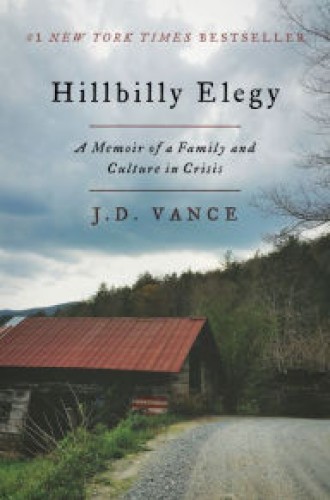Poverty and blame in Appalachia
More jobs would help, says J. D. Vance. So would a stronger work ethic.
J. D. Vance’s memoir quickly jumped onto the New York Times bestseller list. While it has earned its place as a book that’s entertaining, dramatic, and often painful to read, it has also gotten a bump because of election season. Vance, a working-class Scots-Irishman from Kentucky and Ohio, speaks for people whose opinions aren’t often heard. They happen to be his people, and Vance tells us why they are beleaguered, discouraged, patriotic, and Republican. And although he does not count himself among them, most are Donald Trump supporters.
Vance no longer lives in the Appalachian communities where he was raised. He attended college and law school, and then he became a principal at a prestigious San Francisco global investment firm. As an urban professional in his early thirties, he’s busy with travel, work, and a new marriage. So why did he stop to write a memoir?
Read our latest issue or browse back issues.
Because leaving hillbilly America—let alone attending college and landing a white-collar job—is so rare that Vance is still in shock. The story of his narrow escape from a highly dysfunctional and dispirited society conveys both his amazement at his journey and his concern for those left behind. His peers and friends outside of Appalachia had no idea who he was—no idea about his people, his childhood, or their troubles. So he wrote Hillbilly Elegy. “I want people to understand what happens in the lives of the poor and the psychological impact that spiritual and material poverty has on their children.”
Vance grew up in Middletown, Ohio, where his Kentucky grandparents had migrated in the 1950s to work in the steel factories. His happiest memories are of summers in Jackson, Kentucky, where he had uncles whom he adored, mountain creeks to play in, and cousins to play with. But all was not well in Jackson. In Discovery magazine, Razib Khan called the Scots-Irish “the most persistent and unchanging regional subculture in America. Six of Kentucky’s counties are listed in the top 15 poorest counties in the U.S. by median household income, at $23,047 to $25,768.” The figure for the county surrounding Jackson is $28,647.
At first the book entertains the reader with stories of hillbilly culture that match the stereotypes. Take family feuds: Vance’s family in Jackson included a distant cousin who married into the Hatfield family and set off the famous feud by murdering former Union soldier Asa Harmon McCoy. Or consider his uncles: the one named Uncle Teaberry for his favorite gum flavor, or Uncle David, who showed Vance how to roll a marijuana joint when he was 12.
But soon the reader starts feeling the tension of life with the Vance crowd and starts worrying about the little boy who’s telling the story. The same uncles he adored as a child would defend a family member’s honor with switchblades and guns. His Uncle Pet once pulled a man from a truck, beat him up, and ran an electric saw up and down his body (the man survived). His grandmother, Mamaw, tired of Papaw coming home drunk, made good on her threats one night by pouring gasoline over him and lighting a match (a daughter put the fire out). Mamaw also taught Vance how to defend himself, to fight standing sideways and “punch with your whole body.” It was a violent society, and many members of Vance’s family in Jackson were unemployed and looking for trouble.
Mamaw and Papaw escaped the poverty and unemployment when they moved to Ohio. Papaw worked for Arnco Steel, which was an economic savior for many families. Unlike folks back home, Vance’s grandparents could afford a four-bedroom house with indoor plumbing. But despite their financial stability, they struggled to feel at home in the north with its cultural stigma against hillbillies. One hillbilly newcomer horrified his neighbors by grabbing a chicken in his front yard and wringing its neck in preparation for supper. The immigrants brought with them an outsized loyalty to family along with a capacity for threatening behavior.
When Vance’s Uncle Jimmy was a child, he was playing with a toy in a store one day when a clerk told him to leave. Mamaw and Papaw perceived this correction of their son as an insult to the entire family. They stormed into the store, destroyed toys, and threatened the storekeeper.
Vance’s mother, Bev, was a trained nurse who supported her kids in school but couldn’t find stability in other relationships. She and Vance’s father split up when he was a toddler, and she began to move through a lifelong series of relationships. Vance and his half-sister Lindsay had a succession of homes and stepfathers.
They managed as long as Mamaw and Papaw were just down the street. Vance says that they were his best friends. “They . . . spoiled me with treats when I behaved correctly or finished a difficult school assignment. They were also the gatekeepers. They were the scariest people I knew—old hillbillies who carried loaded guns in their coat pockets and under their car seats, no matter the occasion. They kept the monsters at bay.” Mamaw was tough and crude and occasionally violent, but her steady, steely commitment to education and the family’s well-being held the family together. “Mamaw could spew venom like a Marine Corps drill instructor, but what she saw in our community didn’t just piss her off. It broke her heart.”
When Vance was nine, his mom moved 45 minutes away from Middletown, and he lost the stability of life with Mamaw and Papaw. As her latest marriage escalated into violence, Bev began using prescription drugs stolen from her workplace. Then Papaw died, and the loss “turned a semi-functioning addict into a woman unable to follow the basic norms of adult behavior.”
Vance began to fall apart too. He dreaded going home from school. He gained weight, complained of headaches, and at one point had to run from his mother’s anger and call on a stranger, who called the police. By the end of his freshman year he was failing school. He quit doing homework and began experimenting with drugs. Looking back, he realizes that he had had a new stepdad or a new place to live almost every year of his life. “The constant moving and fighting, the seemingly endless carousel of new people I had to meet, learn to love, and then forget—this, and not my subpar public school, was the real barrier to opportunity.”
Then his life turned around. Mamaw realized that her grandson was in danger and invited Vance to live with her permanently. This escape from home was key to his survival. Mamaw wanted Vance to succeed. When a teacher required students to buy a $180 graphing calculator, she found the money when there was little for anything else. She also insisted that Vance get a part-time job.
Around this time Vance began reflecting on his chaotic life and culture. He read books on social policy and the working poor and found information in psychological studies. But he didn’t need a book to explain the turnaround in his life after he moved in with Mamaw. He became happy. “I no longer feared the school bell at the end of the day, I knew where I’d be living the next month, and no one’s romantic decisions affected my life.”
Vance graduated from high school and considered college. He and Mamaw ordered application information, but it was all too strange, too foreign—hillbilly America doesn’t get the same cultural messages that others take for granted. They puzzled over terms that they’d never heard before: work-study, subsidized loans, and Pell Grants. They didn’t know about the financial aid available to them: they saw only a pile of frightening college debt.
Vance considered joining the military. After all, the people he knew kept alive their pride in the United States with military service—it was maybe their last tie to the fabric of American society, and it was like a religion. “The thing about which Mamaw was unquestionably the proudest and most excited was that she and her family did their part during World War II.” A cousin who’d been in the marines urged him to sign up. “They’ll whip your ass into shape,” she said.
At first Mamaw was against it. When a recruiter came to her home, she greeted him with “Set one foot on my f---ing porch, and I’ll blow it off.” But once Vance had enlisted, Mamaw supported him with regular letters. On the first day, Vance called her with the terse two-line greeting permitted to all recruits. As he hung up, Mamaw yelled, “Wait, you little shithead. Are you okay?”
The low expectations and domestic chaos of his home life had given Vance a “learned helplessness.” Boot camp was a turning point. “[It] taught me that I had underestimated myself.” In addition to becoming physically fit and responsible in a job, he learned how to eat for health, balance a checkbook, and shop for a loan. In an interview with Rod Dreher in The American Conservative, Vance says: “If you have good mentors (and I certainly did), you are constantly given tasks, yelled at for failing, advised on how not to fail next time, and then given another try. You learn, through sheer repetition, that you can do difficult things. And that was quite revelatory for me. It gave me a lot of self-confidence.”
Optimism is a precious commodity. According to the Pew Economic Mobility Project, there is no more pessimistic group in America than working-class white people. Their expectations are so low that many simply quit trying for a better life.
Vance went on to attend Ohio State University and Yale Law School. Of the latter he says, “I have never felt out of place in my entire life. But I did at Yale.” As he struggled to be comfortable among students who took comfort and comfortable incomes for granted, he realized that his new identity conflicted with his Middletown identity. No one at Yale would have understood his background, so he didn’t tell them about it. But he began to ask more questions. “Why has no one else in my high school made it to the Ivy League? . . . Why is domestic strife so common in families like mine? . . . Why did successful people feel so different?”
He reflects with sorrow on the Appalachian culture’s isolation and the desperate plight of his family and friends. Most, Vance writes, will never leave Middleton or Jackson and will be stuck economically and socially, lacking both opportunity and agency. He writes about a summer job in a tile warehouse. The work was hard—he had to lift heavy boxes of tiles onto pallets—but it paid $13 an hour with steady raises to $16 after a few years. Yet few employees stuck to it. They skipped work, took extended breaks, and quit. “Too many young men [are] immune to hard work,” Vance decided. “There is lack of agency here—a feeling that you have little control over your life and a willingness to blame everyone but yourself.”
Vance assesses the toxic inertia of this culture with a sympathetic heart. He loves his people and claims his heritage without apology. But his critique of that culture is scathing. “This was my world,” he says, “a world of truly irrational behavior.”
In some parts of Kentucky life expectancy is 67, and a recent study says that number is going down. The people themselves must share the blame, says Vance. “We spend our way into the poorhouse. . . . We eat Pillsbury cinnamon rolls for breakfast, Taco Bell for lunch, and McDonald’s for dinner. . . . We choose not to work when we should be looking for jobs. We don’t study as children and we don’t make our kids study when we’re parents. Our homes are a chaotic mess.”
Do schools make a difference? Yes, Vance says, and his schools did a decent job. Would more jobs help? Certainly, but more jobs will not help those who prefer not to work, some of whom consider not working to be a point of pride. Pell Grants and need-based scholarships helped him, as did the benefits that his grandmother received. But finally, Vance says, government changes are not the solution. The real changes, the ones that gave him hope and deliverance from a culture in crisis, were the ties to stable people in his family. This kind of stability, he insists, has to come from the people themselves.
The book will unsettle liberals and conservatives alike. In listening to Vance, we hear from a community that has been silent. Vance helps us understand the sources of its pessimism, outsized patriotism, and passion for Trump.
In his interview with Dreher, Vance says that working-class people experience smug condescension from the liberals, who express exasperation that the white working class votes against their own economic interests. From the right they get “the basic Republican policy platform of tax cuts, free trade, deregulation, and paeans to the noble businessman and economic growth. . . . These policies have done little to address a very real social crisis. And they’re culturally tone deaf: nobody from southern Ohio wants to hear about the nobility of the factory owner who just fired their brother.”
As a result, working-class people feel betrayed. The country that they dearly love and honor has not lifted them up. It has ground them down and kept them in a corner. Their politics are fueled by anger and the belief that an overeducated elite, infiltrated by alien religions and peoples, has abandoned them. They are open to conspiracy theories and closed to “all that secular media.”
No wonder Trump’s candidacy is music to their ears, says Vance. “His apocalyptic tone matches their lived experiences on the ground.”
A version of this article appears in the September 28 print edition under the title “Narrow escape.”








